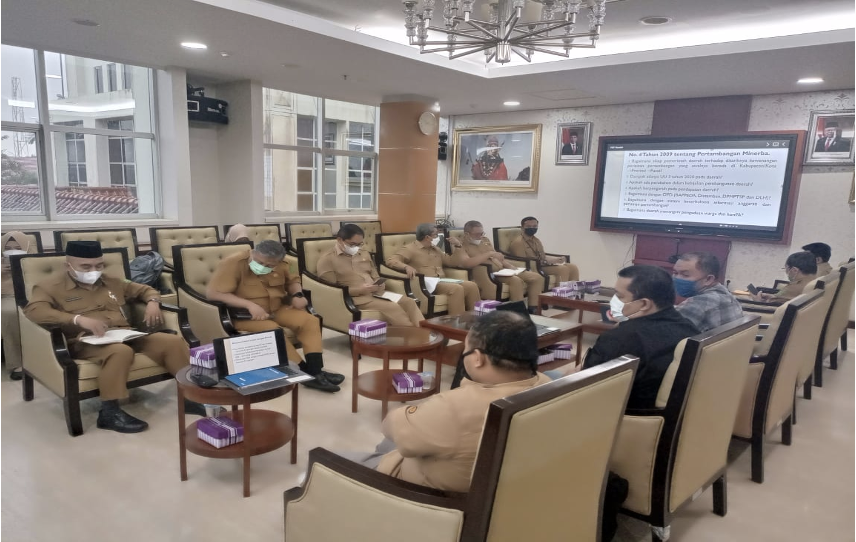
Transparency and accountability in the mining sector need to be carried out in order to open the opportunities for the community to be directly involved in public policy and monitoring, so the public trust in mining management can be achieved. This certainly has a positive impact on the community as well as actors and stakeholders in the mining sector. To realize such goals, it requires collaboration from various parties including the community, involved companies, and also the government.
East Kalimantan (Kaltim) is the province well known for its rich natural resources in Indonesia, the official website of the East Kalimantan Provincial Government reported East Kalimantan’s Local Own-Source Revenue (PAD) in 2020 reached Rp 5.28 trillion. With significant contribution to PAD in natural resources, it is not surprising that the people of East Kalimantan expect accountability for mining activities in their region.
East Kalimantan is one of the participating regions of the Social Accountability program carried out by Publish What You Pay (PWYP) Indonesia with the support from the Global Partnership for Social Accountability (GPSA)-World Bank. For East Kalimantan, PWYP Indonesia partners with Civil Society Organizations (CSOs) Working Groups-30 Association Forum (Pokja 30).
As an initial assessment of the program, Pokja-30 paid a visit to the Kutai Kartanegara Regency Government (Kukar Regency) which was received by Assistant I for Government and People’s Welfare of Kukar Regency, Ahmad Taufik Hidayat in the Executive Room of the Kukar Regent’s Office on Monday (7/6). Pokja-30 conveyed the issue of mining permit and revenues management that affected the community of Sungai Payang Village, Loa Kulu District – the assisted community who lives in ring 1 (one) perimeter on the working area of PT MHU, one of the companies with coal mining license in Kaltim.
Pokja-30 coordinator, Buyung Marajo, expected that this social accountability program can improve transparency and access to information of the public, raise the accountability, enable the public supervision through a citizen complaint service system, and develop the stakeholder forums to open communication among relevant stakeholders.
Ahmad Taufik Hidayat appreciated the program carried out by Pokja-30 as an effort to overcome licensing problems and revenue management in the mining sector. With such a collaborative social accountability approach, [Pokja-30] acts as a partner of the regional government at regency and city level to address mining licensing issues and supervision problems.
The same support also expressed by Kusharyanto, Head of OMBUDSMAN Representative for East Kalimantan Province, as conveyed on the visit of Pokja-30 to OMBUDSMAN Representative of East Kalimantan Office on Tuesday (15/6) to discuss the accountability of the mining sector, including to strengthen community participation.
Similar to the explanation given to Assistant I for Government and People’s Welfare (Kesra) of the Kukar Regency Government, the Pokja-30 reintroduced its institutional role and explained the ongoing program that would coincide with the duties and functions of the Ombudsman for the Province of East Kalimantan. From a series of discussions with a number of Regional Government Organizations (OPD) in East Kalimantan, Buyung concluded that there are issues related to the authority of the local governments.
According to Kusharyanto, civil servants should have standards of public service and complaint management as stipulated in Law Number 25 Year 2009 on Public Services. Kusharyanto considered that it is very important to encourage the community, whether they are affected or not, to participate in preparing service standards for granting mining permits to companies.
As for complaints management, both the central and local governments do not yet have sufficient functions in supervising and managing complaints on mining-related issues under the Mining Law. While it is rightful for the public to gain their rights of welfare from the capitalization of the natural resources in East Kalimantan as Kusharyanto conveyed at the end of the discussion.
In line with East Kalimantan OMBUDSMAN’s view, Buyung Marajo, the Pokja-30 Coordinator emphasized, “We noted the complaints from the local governments that do not have sufficient authority in issuing permits and monitoring so they are unable to handle complaints from the community regarding the impacts of mining activities,” said Buyung.
The importance of transparency and accountability initiatives in the mining sector is also recognized by the government. The mining management in accordance with the principles of good governance will provide benefits for all parties, especially the community. Well-managed natural resources will bring prosperity to the community as well as preserve the environment.